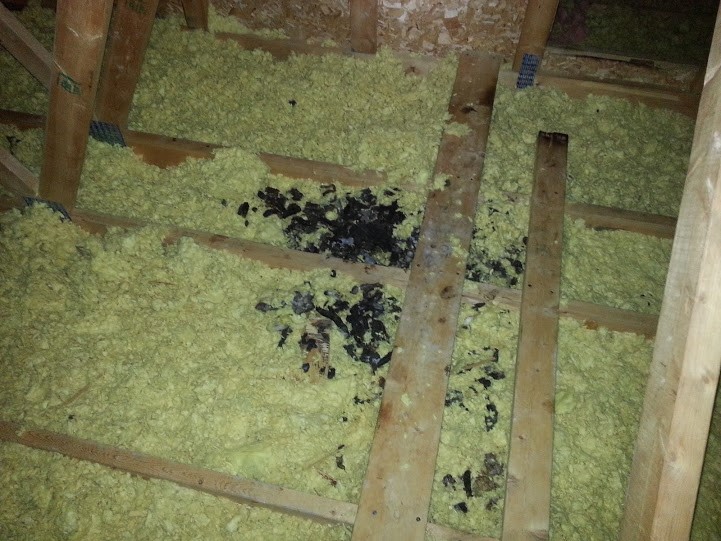Highly populated residential areas are favourites of raccoons. Guelph has the same problems with raccoon as many other Ontario towns or cities. Lots of different wild animals carry all sorts of diseases that can be transmitted to humans. However, because of the dense population in some areas we are most exposed to critters like raccoons. Their droppings carry many different harmful bacteria. So, it’s important to be aware of any animal feces on your property.
Raccoons defecate in communal sites known as latrines. They are usually found around the base of trees, fallen logs, decks and attics. Raccoon feces are usually dark and tubular with a pungent odor. Latrines can carry many dangerous bacteria transmitted through the air, water or soil.

Raccoon droppings inside an attic
The largest health risk surrounding raccoon feces is Baylisascaris procyonis or raccoon roundworm. This is a parasite that is found in a raccoon’s intestines and the eggs show up in the stool. It’s a great risk to humans as raccoons are generally found close to your property. People can unknowingly ingest roundworm eggs while in close proximity of raccoon feces. Symptoms include loss of muscle control, fatigue and liver complications.
Giardia is another infection that can be transmitted by raccoon droppings. People can get this by ingesting the infected cysts producing nausea, abdominal cramps and diarrhea. Lots of wild animals carry Giardiasis. This organism can contaminate water and soil.
Raccoons also transmit Leptospirosis, a bacterial infection, in their urine. Aching muscles, headache and high fever are all symptoms of this infection. Although it’s not found in their droppings, it is still a health risk when considering a raccoon latrine.
It’s important to identify and remove any potential raccoon feces from your property. If they are in your attic it can easily find its way into your air quality. Do not attempt to dispose of anything yourself. It could lead to great health risks or other infestations that you’re unaware of.
At first sighting call the Guelph Skedaddle Humane Wildlife Control. They are properly trained to remove any potential risks and inspect any parts of your property the raccoons might be getting in.
Connect with Skedaddle today – 1-888-592-0387


